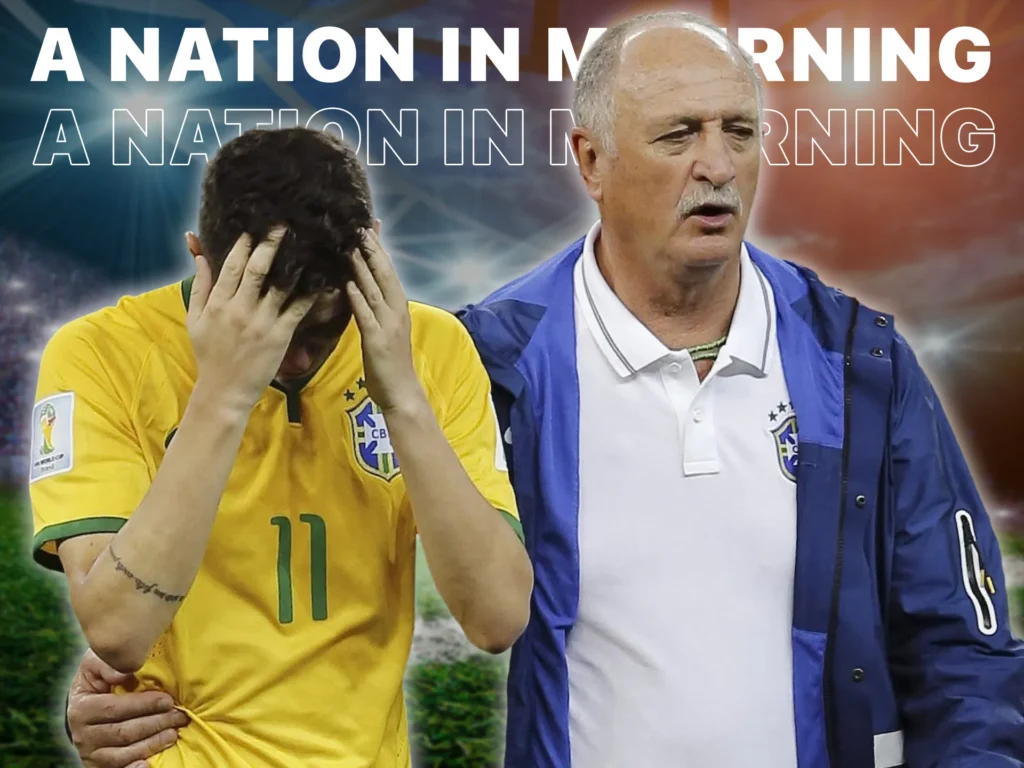7:1: The Most Devastating Defeat in Brazil’s Glorious Football History
The 2014 FIFA World Cup semi-final between Brazil and Germany was expected to be a fierce and closely contested match, with two of football’s most storied nations facing off for a place in the final. However, what unfolded on July 8, 2014, in Belo Horizonte was something no one could have anticipated: a historic and humiliating 7-1 defeat for Brazil on their home soil. This match, often referred to as the “Mineirazo,” has left an indelible mark on the history of football and is considered one of the biggest upsets in the sport.
First Half: Germany’s Ruthless Efficiency

The match started with both teams showing early nerves, but it quickly became clear that Germany was the more organized and composed side. By the 11th minute, Thomas Müller had already put Germany ahead, capitalizing on poor Brazilian defending during a corner kick. What followed was an unprecedented collapse of Brazil’s defense.
Between the 23rd and 29th minutes, Germany scored four more goals, leaving the Brazilian team and fans in utter shock. Miroslav Klose, who became the World Cup’s all-time top scorer during this match, netted the second goal, followed by two goals from Toni Kroos in just two minutes, and finally, Sami Khedira added the fifth. By halftime, the score was a humiliating 5-0, with many Brazilian fans in tears, unable to comprehend what was happening.
Second Half: Brazil’s Despair Continues

The second half brought no relief for Brazil. Although Germany eased off the pressure, they still managed to score two more goals through André Schürrle, making it 7-0. Brazil’s consolation goal came in the 90th minute from Oscar, but it did little to soothe the pain of such a catastrophic defeat.
This match wasn’t just a defeat; it was a demolition. The Brazilian team, once feared and respected, was left in ruins on the pitch. The absence of star player Neymar due to injury and the suspension of captain Thiago Silva were seen as significant blows, but few could have predicted such an extreme outcome.
The Aftermath: A Nation in Mourning

The reaction in Brazil was one of national mourning. Football is more than just a sport in Brazil; it’s a way of life, a source of national pride. The scenes of devastation in the stadium were mirrored across the country. In cities like São Paulo and Rio de Janeiro, riots broke out, with buses set on fire and shops looted. The police were forced to use tear gas to control the crowds.
Brazilian coach Luiz Felipe Scolari took full responsibility for the loss, calling it the “worst day of my life” and a “catastrophe.” The players, too, were visibly distraught, knowing they had not only lost a match but also let down an entire nation.
Comparisons to Past Failures

This defeat was immediately compared to another dark day in Brazilian football history: the “Maracanazo” of 1950, when Brazil lost 2-1 to Uruguay in the World Cup final at the Maracanã Stadium. However, many argue that the 7-1 loss to Germany was even more painful, given the scoreline and the stage of the tournament.
The 1920 6-0 loss to Uruguay had long stood as Brazil’s worst defeat, but that record was shattered in Belo Horizonte. For a country that prides itself on being the only nation to have won five World Cups, this was a blow to the very core of its identity.
Germany’s Tactical Masterclass

While Brazil’s collapse was shocking, it’s important to recognize the brilliance of Germany’s performance. Joachim Löw’s side played with a level of precision and ruthlessness rarely seen at the highest level. Their quick, incisive passing and clinical finishing left Brazil with no chance.
Germany’s victory was not just a result of Brazilian errors; it was a testament to their preparation and execution. The Germans exploited every weakness in the Brazilian setup, showing why they would go on to lift the World Cup trophy after defeating Argentina in the final.
Long-Term Impact on Brazilian Football

The impact of this defeat on Brazilian football was profound. It led to widespread calls for reform within the Brazilian Football Confederation (CBF). Many questioned the country’s footballing philosophy, which seemed outdated compared to the modern, efficient style demonstrated by Germany.
In the years following the defeat, Brazil struggled to regain its former dominance. Although they managed to win the 2019 Copa América, the shadow of the 7-1 defeat still looms large, a constant reminder of the need to evolve.
Cultural and Psychological Impact

Beyond the tactical and technical aspects, the 7-1 defeat had a deep psychological impact on Brazil. The humiliation on home soil, in front of a global audience, was a wound that took years to heal. The match became a symbol of failure, not just in sport, but in the nation’s broader struggles with issues such as inequality and economic instability.
For the players, especially those who took part in the match, it was a scar that would follow them for the rest of their careers. The likes of David Luiz, who was captain in Thiago Silva’s absence, were heavily criticized, and for some, the match marked the end of their international careers.
Conclusion: A Match That Will Never Be Forgotten

The 7-1 semi-final between Brazil and Germany is more than just a football match; it is a significant moment in sports history that will be remembered for generations. For Germany, it was a triumph that showcased the strength of their footballing philosophy. For Brazil, it was a painful reminder that even the most successful teams can fall.
This match serves as a case study in how quickly fortunes can change in football and the importance of resilience and adaptation. While Brazil has since moved forward, the memory of that night in Belo Horizonte will forever be a part of the nation’s footballing narrative.

